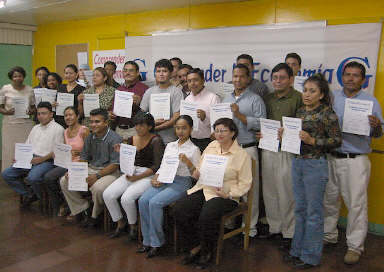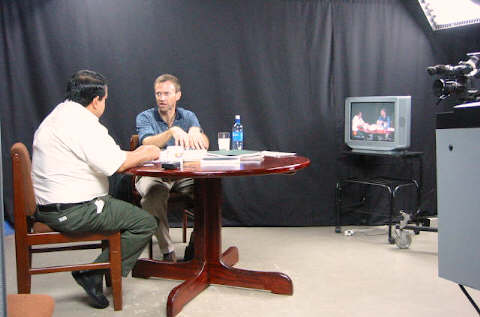
Instituto
Henry George ...![]()
Managua, Nicaragua
 |
Instituto
Henry George ... |
![]() 18th,
19th & 20th CE Economics Courses Graduate
18th,
19th & 20th CE Economics Courses Graduate
![]() IHG
Imparts First Four CE Workshops
IHG
Imparts First Four CE Workshops
![]() Progress
Brings More Poverty for Nicaraguans
Progress
Brings More Poverty for Nicaraguans
18th,
19th & 20th CE Economics Courses Graduate
Managua, 20 Diciembre 2003
The Instituto Henry George's 18th, 19th and 20th intensive "Comprender la Econom�a" political economy courses graduated a total of 93 students on September 24th, November 5th and December 17th respectively. The increase of enrollments and graduates with these three courses indicate a continuing interest in the CE course despite the worsening economic conditions which make it more difficult for the general public to participate. The IHG finished 2003 with a total of seven CE courses completed with a total of 357 students and 202 graduates. Click here for complete "Comprender La Econom�a" Course Statistics, 2000-2003. The IHG's dedicated volunteers played a growing role in promoting, administering and imparting these last three CE courses (see photos).
|
|

CE XX Course
Graduates, December 2003.
>> Related photos
IHG
Imparts First Four CE Workshops
Managua, 20 Diciembre, 2003
After three years of developing its teaching method and establishing a base of popular awareness of the CE course and the Georgist remedy, the IHG has progressed to where it is able offer the Comprender La Econom�a course as a condensed workshop. The CE workshops will be directed at Nicaraguan business owners, NGO's, religious groups, news editors and reporters, economic advisors, government officials, etc. The IHG gave its first four CE workshops in Managua on November 19th, Granada on November 21st, Le�n on November 29th and San Juan del Sur on December 7th. The first workshop in Managua was a success in execution, but was only attended by 9 of the 130 invited guests. The high PR effort and low turnout was a lesson for the IHG which became more clear with the subsequent successes of the following three workshops. The following workshop in the city of Granada was attended by 21 individuals, followed by Le�n with 34 and finally San Juan del Sur with 47 participants. What was the difference? The Managua workshop was promoted exclusively by the IHG, exclusively invited business, civic and political leaders, included a lunch and charged a $6.50 registration fee. The others were promoted through local organizations, were open to the general public, offered no lunch and charged no entrance fee. The latter strategy seems to have worked better for attracting an audience. All the workshops were very successful in that new techniques of preparation and presentation (eg overhead projector) were utilized with good results. In all four workshops, the audience was very satisfied and expressed their interest in a public study of the application of the Georgist economic remedy in Nicaragua. The lesson of success from these first four CE workshops sets the stage for a planned series of 20-40 such workshops to be offered throughout Nicaragua in 2004, in addition to the regular seven CE intensive courses in Managua.
|
|
|
|
Progress
Brings More Poverty for Nicaraguans
Managua, December 2003
During the last six months, the IHG has observed the intensifying symptoms of economic crisis resulting from the deepening recession in Nicaragua. While the government does its best to foment the illusion of progress via continual dependence on foreign "investment" and privatization of the public dominion, the majority of Nicaraguans are perceiving the reality that their economic and social conditions are steadily deteriorating. Limited construction of infrastructure in areas dominated by already wealthy land owners, and increasing importation of foreign goods are accompanied by the fact that consumer prices keep on creeping up, and many times jumping up (e.g., the price of both of the daily newspapers just increased 60%!). Meanwhile, more than 50% of the people one may see in the course of a day have incomes stagnated at the level of mere subsistence; men, women and children rutting through garbage is a common sight; teenagers and children wearing the flimsiest of rubber sandals try to sell made-in-Taiwan products as they dodge in between smoking jalopies and shiny new four wheel drive luxury vehicles. People are afraid to travel in buses and taxis at night because of growing amount and sophistication of street crime (still relatively light compared to more "developed countries"). More and more young people with little hope for participation in the "nice" economy turn to drugs and gangs. As you walk down the street, able bodied men and women ask you for money. And real estate prices keep on climbing.
Henry George revealed that speculation in land, caused by the unjust practice of allowing private ownership of land value, causes an artificial inflation of prices while denying access of labor to profitable employment. This process continues until some crisis point is reached and the land speculation fever subsides. In countries like Nicaragua, where ownership of land and the distribution of wealth is jealously controlled by a small minority, the relief only comes after many men, women and children have died slowly or violently from the many physical and social diseases which this system of privilege generates. These are the conditions which lead to the Sandinista-led revolution in 1979. Nicaraguans will soon need another revolution, but perhaps this time, with the help of the IHG, they may be able to conceive of a different kind that can truly free them from the self-destructive "progress" which is strangling their economy and society.

IHG Director Paul Martin explains the
formula for Nicaraguan prosperity, on Canal 4, September 2003.
 Return
to main News-Noticias Page
Return
to main News-Noticias Page
![]()
"Work with passion,
have fun, save the world!"
"Trabajar con pasi�n, divertirse,
salvar el mundo!"
since
December 2003